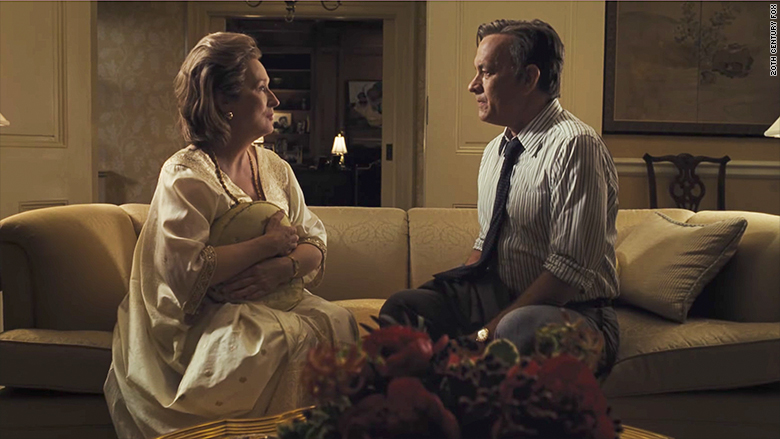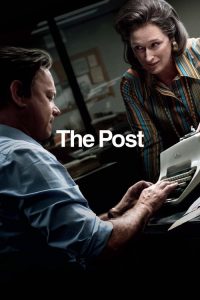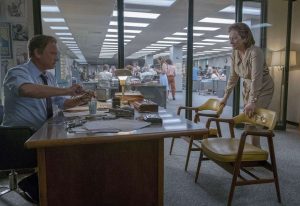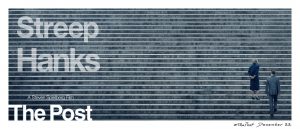Directed by Steven Spielberg | Written by Liz Hannah and Josh Singer | 116 min
It’s hard to know what the average American is thinking these days about the nation’s administration and its boorish Commander-In-Chief, but despite polls suggesting he’s unpopular, it’s fair to say his rage at the pillars of the American First Amendment, the free press, has given some people the idea that august periodicals like The New York Times are publishers of “fake news.” That may be Trump’s most terrifying legacy. (So far.)
For the terrified, The Post will be a boon. It’s a deeply nostalgic look back at an era when people still bought newspapers and trusted what was written there. In the annals of journalism, it’s a great story—how The Washington Post took on Nixon and helped reveal the truth about covert American foreign policy in Southeast Asia. In Spielberg’s hands, it’s also painfully obvious. A crowdpleaser, no doubt, but a surprisingly staid and uninspired one.
We open in Vietnam, where a researcher named Daniel Ellsberg (Matthew Rhys with awful hair) is embedded among the grunts, down in the shit, when a firefight breaks out. Except this is a deeply artificial-looking jungle, badly lit, with fake-looking rain. All the while I’m asking myself, “This is the guy who made Raiders and Private Ryan?” And this while my call for a moratorium on Creedence, especially “Run Through The Jungle” or “Green River,” repeatedly dredged up for films with any kind of Vietnam content, is being ignored.
We shoot forward in time to New York and DC in the early ’70s. Ellsberg drops off a section of a report he helped author to the Times about how the government lied to the people, how it helped extend the war in Vietnam. Kay Graham (Meryl Streep) is the publisher of the Post, a gig she inherited from her father, but not directly—he gave the paper to her husband, who later killed himself.
Ben Bradlee (Tom Hanks) is the Editor-in-Chief, rightly annoyed that they were scooped by the Times on the Pentagon Papers story. But when Nixon tries to muzzle the New York paper, the Post gets its hands on pages of the incriminating report. Will it publish, especially when federal indictments and prison could await everyone involved?
I get that it’s a little unfair to compare every film in a director’s 45-year-career to his best work, but with Spielberg that’s tough, given his cultural influence. And it’s not that The Post is badly made, it’s just that so many of the director’s choices here are trite and transparent.
Let’s start with the look: Spielberg and his favourite DP, Janusz Kaminski, have chosen to shoot and light the film like a Annie Leibowitz photo-spread in Vanity Fair. It’s one of the more anti-cinematic films of either of their careers. This isn’t a movie that looks like anything from the period—beyond the hair, make-up, and cigarettes—nor does it look like anything we’ve seen lately. Its aesthetics are garish and self-conscious, with characters posed and sorted like chess pieces on a board.
Once its first-act set-up is established, momentum in the script and the professionalism of the actors helps generate some emotion. Streep is typically good, but frequent scene-partner Hanks sometimes sounds like he’s doing an Edward G. Robinson impression. “Where’s your freedom of speech now, see!” Arrayed around them are a stable of solid character actors, including Tracy Letts, Carrie Coon, Alison Brie, Jesse Plemons, the very busy Michael Stuhlbarg, and Bob Odenkirk, terrific as a grizzled newsman. Bruce Greenwood is physically a lot like Robert McNamara with the slick, black hair, but not nearly creepy enough. Sarah Paulson is totally wasted serving sandwiches. She has one scene where she says a potent line or two. It’s in the trailer.
The Post makes its point: This was a triumph over corruption, and sure, it would be great if the Fourth Estate could repeat that feat in the current day. Maybe the film’s best feature is its one subtle undercurrent—and even then, not so subtle—that women need to assert their own power against the patriarchy, and if they do, and are true to themselves, anything is possible. But even in that, it stumbles by framing Graham as a hero. Yes, OK, she risked her good name, her company, and her reputation to stick by her ideals, but the film shows her life to be a series of comfortable Washington lunches and garden parties—she’s in bed with the people in power and reluctant to rock the boat and upset her comfortable status. I feel like a host of Steep’s recent characters—Julia Child, Sister Aloysius Beauvier, and Miranda Priestly, to name but three—would all eat Graham alive. In a more complex film, Graham’s vulnerability would be fascinating, but it’s somehow less so here.
I can’t deny I was moved by the film’s celebration of journalism, but it’s not fit to kiss the hem of the few great films about news, from All The President’s Men to Network to Broadcast News to The Insider to Spotlight.
So, why is it getting all this approbation? It’s a movie people need right now, and I won’t argue with that.













